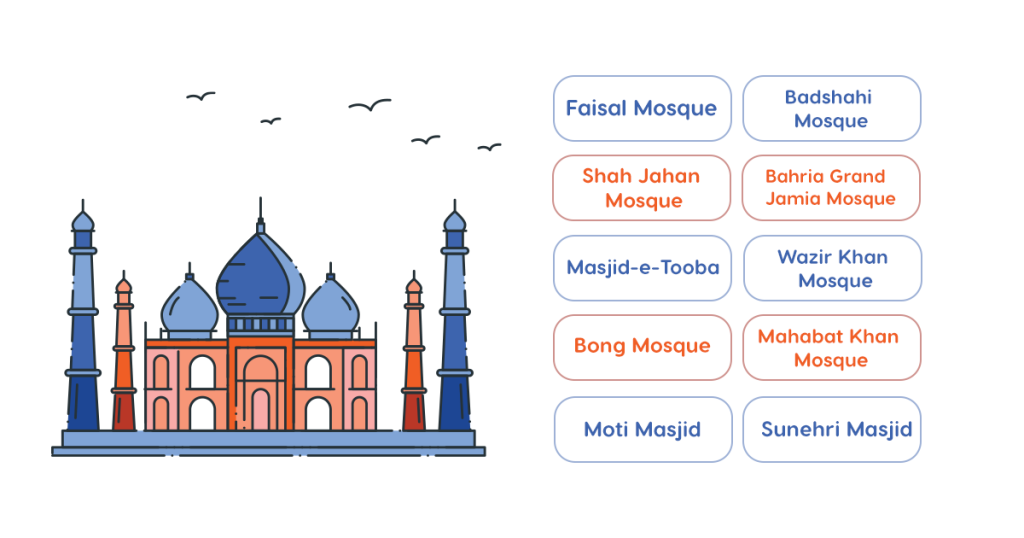Pakistan is the Muslim country and has a deep connection to the Islamic heritage. It is the home to some of the most beautiful mosques in the world. These mosques not only serve as a place where people come and pray but they also serve as a symbol of Pakistan’s rich culture and history. In this article, we will explore the top 10 most beautiful mosques in Pakistan. We will highlight their different features and the stories behind them. Whether you love history, architecture, or just appreciate beautiful places, these mosques in Pakistan are worth discovering for you.

10 Remarkable Mosques in Pakistan with Extraordinary Beauty
In this table, we have listed ten of the most beautiful mosques in Pakistan. Each of these mosques stands out for its unique design and impressive features.
| Sr. No. | Mosque Name | City |
| 1 | Faisal Mosque | Islamabad |
| 2 | Badshahi Mosque | Lahore |
| 3 | Shah Jahan Mosque | Thatta |
| 4 | Bahria Grand Jamia Mosque | Lahore |
| 5 | Masjid-e-Tooba | Karachi |
| 6 | Wazir Khan Mosque | Lahore |
| 7 | Bong Mosque | Rahim Yar Khan |
| 8 | Mahabat Khan Mosque | Peshawar |
| 9 | Moti Masjid | Lahore |
| 10 | Sunehri Masjid | Lahore |
Craving a taste of Lahore’s vibrant culinary scene? Here are the 6 most popular places for street food in the city that you must not miss.
Faisal Mosque in Islamabad
Faisal Mosque is known as National Mosque of Pakistan, nestled in between beautiful Margalla hills. It is located in the capital city, Islamabad. It is fifth-largest mosque in the world and the largest mosque in Middle East and South Asia. It is named after the King Faisal of Saudia Arabia. Faisal Mosque is the work of Turkish architect Vedat Dalokay, who was later on awarded with Agha Khan award because of the beautiful architect of the mosque.
Its shape is basically an eight-sided concrete shell and this geometric concept was taken from the Kaa’ba. The main prayer hall and courtyard of this mosque can hold round about 100,000 people. One of the interesting facts about this mosque is that it lacks any type of dome and four (260 feet) tall minarets surround and support it. Other than being a mosque, it includes a library, lecture hall, a museum, as well as café.
| Location | Islamabad, Pakistan |
| Established | Construction began in 1976, completed in 1986 |
| Architect | Vedat Dalokay (Turkish architect) |
| Style | Modern Islamic architecture |
| Capacity | Approximately 100,000 worshippers |
| Height | Minarets are 80 meters (262 feet) tall |
| Unique Features | No traditional domes; large prayer hall; open courtyard |
| Significance | National mosque of Pakistan |
| Construction Cost | US$120 million |
Badshahi Mosque in Lahore
Badshahi Mosque was constructed between 1671 and 163 in Lahore, during the Mughal era. It is the third largest mosque in Pakistan and renowned for its massive size and the beautiful design. If we talk about its appearance, it has a grand entrance with towering minarets, a large courtyard, and beautiful prayer hall. Its central dome is decorated with beautiful patterns and 4 massive minarets, each of 54 meters height. The mosque is built with red stones and the prayer hall is divided into different sections that features calligraphy and floral motifs. Badshahi Mosque is located near the Lahore Fort. Near the entrance of the mosque, you will find the Tomb of Dr. Muhammad Iqbal, who is the founder and national poet of Pakistan.
| Location | Lahore, Pakistan |
| Construction Period | 1671-1673 |
| Founder | Emperor Aurangzeb Alamgir |
| Architectural Style | Mughal |
| Architect | Nawab Zain Yar Jang Bahadur |
| Materials | Red sandstone, marble inlay |
| Minarets | 4 minarets, each approximately 54 meters tall |
| Dome | Central dome, adorned with intricate patterns |
| Nearby Attractions | Lahore Fort, Shalimar Gardens |
Looking to stay active and engaged in sports? Here are the top 8 sports clubs in Karachi that offer excellent facilities and programs for athletes of all levels
Shah Jahan Mosque in Thatta, Sindh
Shah Jahan Mosque is located in Thatta, Sindh. It is a beautiful example of Mughal architecture. This mosque is built in the 17th century by Mughal Emperor Shah Jahan, between the years 1644 and 1647. During its construction, red bricks and blue tiles were used and that combination creates a beautiful visual effect. The mosque has 93 domes of different sizes, making it the mosque with the greatest number of domes in Pakistan. Just like other mosques, it does not have central dome, instead they are spread across the structure that makes it more unique and appealing. The Shah Jahan Mosque reflects the Mughal Emperor Shah Jahan’s love for architecture and his efforts for protecting the Islamic culture. Today, this mosque is not only an active place where people can go for worship but also it is a UNESCO World Heritage Site and a popular tourist destination.
| Location | Thatta, Sindh, Pakistan |
| Construction Period | 1644-1647 |
| Builder | Mughal Emperor Shah Jahan |
| Architectural Style | Mughal, with regional Sindhi influences |
| Materials | Red bricks, glazed blue tiles |
| Number of Domes | 93 domes |
| Unique Features | Intricate blue and white tile work, geometric patterns, floral designs, and exceptional acoustics |
| Capacity | Approximately 20,000 worshippers |
| Nearby Attractions | Makli Necropolis, Keenjhar Lake |
Bahria Grand Jamia Mosque in Lahore
The Grand Jamia Mosque is located in Lahore in Bahria Town. It is one of the largest and the most beautiful mosques in Pakistan. The mosque was completed in 2014 and it is known for its beautiful architecture and the modern design that blends traditional Islamic architecture and the modern touches. Nayyar Ali Dada designed this mosque, who is the famous Pakistani architect and it is a blend of Mughal, Persian, and Modern architectural styles. Special handmade bricks are used for its exterior and its structure includes four tall minarets, each minaret is of height 165 feet and a grand central dome that is surrounded by 20 smaller domes.
The main prayer hall of Bahria Grand Jamia Mosque can hold about 25,000 worshippers while the entire mosque can hold around 70,000 people. Its floor is covered with the handmade Turkish carpets and its interior design also consists of handcrafted tiles by artists of Multan. Other than a place to pray, it has Islamic art library, a library, and special area for women to pray.
| Location | Bahria Town, Lahore, Pakistan |
| Construction Completed | 2014 |
| Architect | Nayyar Ali Dada |
| Architectural Style | Blend of Mughal, Persian, and contemporary Islamic architecture |
| Materials | Handmade bricks, marble, tiles, chandeliers |
| Number of Domes | 1 central dome and 20 smaller domes |
| Minarets | 4 minarets, each approximately 165 feet tall |
| Dimensions | Large prayer hall, 70,000 total capacities |
| Unique Features | Islamic art gallery, library, gardens, women’s prayer area |
| Nearby Attractions | Eiffel Tower replica, Bahria Town attractions |
Looking to enhance your skills in online business? Here are the 6 Best Ecommerce Training Centers in Pakistan to help you master the art of digital commerce and succeed in the fast-growing e-commerce industry.
Masjid-e-Tooba in Karachi
Masjid-e-Tooba is one of the most unique and beautiful mosques in Karachi. It is located in the Defence Housing Authority (DHA). The mosque was built in 1969 and is considered as one of the largest single-dome mosques in the world. It was designed by Pakistani architect Dr. Babar Hamid Chauhan and engineer Zaheer Haider Naqvi. What makes Masjid-e-Tooba special is its largest, white dome that is placed on the ground without any central pillars for the support purposes.
The dome has a diameter of 72 meters and a height of 18 meters. This feature makes mosque spacious and open as well as airy. Masjid-e-Tooba is made with pure white marble which gives it a bright appearance and it looks more beautiful when sunlight reflects its surface. The large prayer hall can accommodate 5000 worshippers at a time. These is also a beautiful marble courtyard that surrounds the mosque and provides additional space for worships during larger gatherings or special occasions.
| Location | Defence Housing Authority (DHA), Karachi, Pakistan |
| Construction Year | 1969 |
| Architect | Dr. Babar Hamid Chauhan |
| Engineer | Zaheer Haider Naqvi |
| Architectural Style | Modern Islamic architecture |
| Materials | White marble |
| Dome Features | Single large dome with a diameter of 72 meters (236 feet) and height of 18 meters (60 feet) |
| Minarets | 1 minaret, 70 meters (229 feet) tall |
| Interior Features | Minimalist design, no central pillars, excellent acoustics |
| Capacity | 5,000 worshippers in the main prayer hall |
| Nearby Attractions | Clifton Beach, DHA Golf Club, Mohatta Palace |
Transform your living space with unique and stylish pieces! Here are the 8 Best Home Decor Stores in Lahore to find the perfect furnishings and accessories for your home.
Wazir Khan Mosque in Lahore
Wazir Khan Mosque is located in the heart of Lahore city. It was built in the 17th century during Mughal era and it is known for its beautiful tile work and designs. The mosque was constructed between 1634 and 1641 by Hakim Ilmuddin Ansari who was also famously known as Wazir khan. It is situated near the Delhi gate of Lahore’s famous Walled city. One of the most attractive features of Wazir Khan Mosque is its decoration.
The mosque is covered with beautiful tile work and calligraphy. It’s wall and ceilings are decorated with colorful floral patterns by using a unique technique named as “Kashi Kari”. Different colors including blue, green, yellow, orange, and others are used. The calligraphy that is done on the walls consists of Quranic verses. It has four tall minarets each of which is standing around 107 feet high and a large central dome.Main prayer area has multiple chambers and the entrance of mosque is through a gateway, named as “Shahi Hammam”. The mosque also has an ancient bazar that is known as “Wazir Khan Chowk”. Today, Wazir Khan Mosque is considered one of the Lahore’s most treasured monuments that reflects beauty and the history of the city.
| Location | Near Delhi Gate, Walled City, Lahore, Pakistan |
| Construction Period | 1634-1641 |
| Built By | Hakim Ilmuddin Ansari (Wazir Khan), Governor of Lahore |
| Architectural Style | Mughal architecture with Persian, Central Asian, and Indian influences |
| Materials | Brick, lime plaster, glazed tiles, frescoes |
| Number of Domes | 1 large central dome |
| Minarets | 4 minarets, each approximately 107 feet high |
| Capacity | Approximately 1,000 worshippers |
| Nearby Attractions | Shahi Hammam, Lahore Fort, Badshahi Mosque |
Bong Mosque in Rahim Yar Khan
The Bong Mosque is also known as Sadiq Garh Mosque. It is the beautiful mosque that is located in the small town of Mauza Bagho Bahar near Rahim Yar Khan. The mosque was built in 1964 by Nawab Sadiq Muhammad Khan V who was the ruler of princely state of Bahawalpur. The basic purpose of its construction was to honor the spiritual leader, pir Ghous Bahauddin. White marble has been used in the construction of Bong Mosque that makes it look grand and majestic. The mosque has several domes, with the largest central dome is very eye-catching because of its size. It has also four tall minarets, each has a crescent moon on their top that adds beauty to them. Inside the mosque, decorations are very impressive.Walls and ceilings are covered with colorful tiles and calligraphy f Quranic verses. The floors are made up of polished marble, perfect for prayer and reflection. The Bong Mosque has a larger courtyard that is surrounded with beautiful gardens and fountains.
| Location | Mauza Bagho Bahar, near Rahim Yar Khan, Punjab, Pakistan |
| Construction Year | 1964 |
| Built By | Nawab Sadiq Muhammad Khan V, ruler of Bahawalpur |
| Architectural Style | Islamic, Mughal, and modern architecture |
| Number of Domes | Multiple domes, with one large central dome |
| Minarets | 4 tall minarets, each topped with a crescent moon |
| Capacity | Several hundred worshippers |
| Nearby Attractions | Rahim Yar Khan city, Sadiq Garh Palace |
Mahabat Khan Mosque in Peshawar
Mahabat Khan Mosque is the historic mosque located in Peshawar. It is one of the most important and beautiful mosques in city that was built in 17th century. The mosque was constructed during the rule of Mughal Emperor Shah Jahan. It was built by Mahabat Khan who was the governor of Peshawar and that’s why it is named after him and it was completed in 1639. One of the attractive features of Mahabat Khan Mosque is its grand entrance.It has a large gate with intricate designs and beautiful tile work. Walls and ceilings of this mosque is covered with beautiful patterns and calligraphy that include verses from the Quran. Inside the mosque, prayer hall is very large and open and it provides a great space for many worshippers.
| Location | Peshawar, Khyber Pakhtunkhwa, Pakistan |
| Construction Year | 1630 |
| Built By | Mahabat Khan, governor of Peshawar |
| Architectural Style | Mughal architecture |
| Materials | Red sandstone, marble |
| Interior Features | Detailed carvings, colorful tile work, Quranic calligraphy |
| Nearby Attractions | Peshawar Old City, Qissa Khwani Bazaar |
Enhance your beauty and well-being with expert care! Check the 8 Best Aesthetic Clinics in Karachi for Personal Care and Treatment to achieve your desired look.
Moti Masjid in Lahore
Moti Masjid is the beautiful mosque located in Lahore. It was built in 17th century and it is known for its elegant design and history. The mosque is situated within the Lahore Fort which is the famous historical site of city. Moti Masjid was constructed during the reign of Mughal Emperor Shah Jahan who is also known for building tag Mahal.
The mosque was completed in 1645 and was named “Moti Masjid” because of its beautiful white marble which gives it a pearl-like appearance. This mosque is entirely made up of white marble which makes it look bright and clean. Building has three domes with intricate patterns. Inside the mosque, design is truly very impressive. The main prayer hall is spacious and wall and ceilings are decorated with patterns. The courtyard has a larger water fountain in the center that provides a cool and refreshing atmosphere.
| Location | Lahore Fort, Lahore, Punjab, Pakistan |
| Construction Year | 1645 |
| Built By | Mughal Emperor Shah Jahan |
| Architectural Style | Mughal architecture |
| Materials | White marble |
| Number of Domes | 3 domes |
| Minarets | None |
| Capacity | Moderate, accommodates a large number of worshippers |
| Nearby Attractions | Lahore Fort, Badshahi Mosque, Shalimar Gardens |
Sunehri Masjid in Lahore
Sunehri Masjid which is also known as the Golden Mosque is located in Lahore. It is known for its beautiful architecture and its unique golden appearance because of the golden tiles used in it. It was built in the 18th century and was constructed during the reign of Mughal Emperor Farrukhsiyar. One of the most impressive features of it is its impressive façade. The masjid is covered with the beautiful tiles that have golden share and that gives shine and elegant appearance.
It has large and open courtyard with spacious area for prayers and gatherings. In the center of courtyard there is a water fountain that helps in keeping the area cool. Inside the mosque, the design is equally beautiful and prayer hall features a series of domes and minarets.
| Location | Near Ravi Road, Lahore |
| Built | 19th century |
| Architectural Style | Mughal Revival |
| Significance | Known for its beautiful golden domes and intricate tile work |
| Notable Aspects | One of Lahore’s prominent historical mosques, recognized for its artistic and architectural beauty |
| Nearby Landmarks | Shalimar Gardens, Lahore Fort |
Need a reliable ride? Here are the 7 Best Taxi Booking Services in Lahore to get you where you need to go!
Final Notice
Pakistan is the home to some of the most beautiful mosques in the world. Each of the mosque showcases architectural styles and the stunning designs. Exploring these top 10 mosques provides you the wonderful opportunity to experience the artistry and craftmanship. Visiting these sites allows you to appreciate the tradition and expertise architects have shown while constructing these masterpieces.





